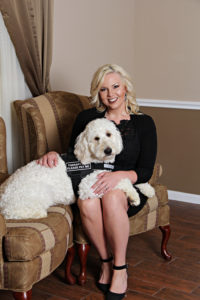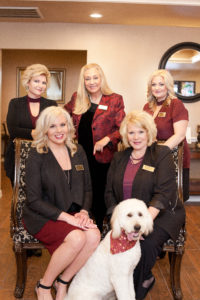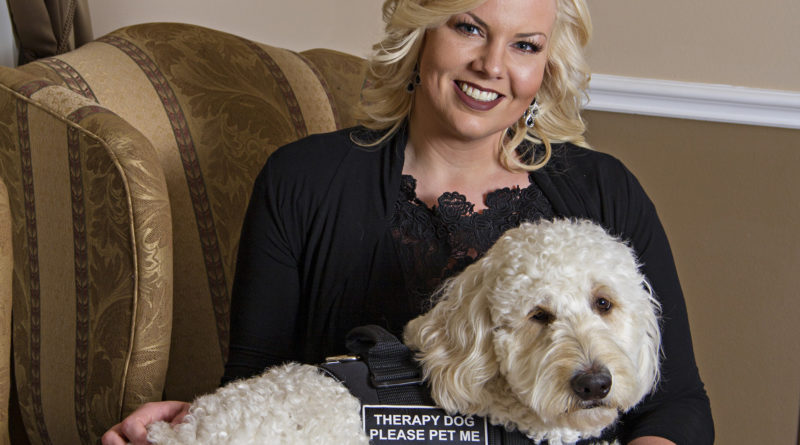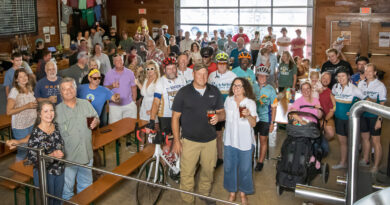Celebrating life: Crotty Funeral Home personalizes final journey
Photo by Becky Stinehour
Prancing quietly through the rooms of the Crotty Funeral Home in Belton is a light stepping therapy dog named Libby, bringing smiles to the faces of the bereaved.

Having a therapy dog as a means of comforting families was owner Jarrah Crotty’s idea. Jarrah is part of a new generation bringing innovative ways of honoring loved ones to the business.
Libby proudly wears a vest that reads, “Therapy dog. Pet me.” She finds a way to let her presence be known — especially when she senses that someone is grieving. She gently walks up to that person, puts her head on a knee, sits under a chair while funeral arrangements are being made or climbs up on a couch to sit close to a person who is crying.
Libby is a golden doodle and among the growing ranks of pet therapy and comfort dogs in funeral homes, providing solace for grieving families. She stands about two and a half feet high at her head and is covered with soft white fur.
Libby was just 8 weeks old when Jarrah adopted her for her personal pet. Today, Libby is the ambassador of Crotty Funeral Home. “Two years ago I saw a video about therapy dogs in funeral homes,” Jarrah said. “I loved the idea.”
At first she said she was concerned that some people might not like dogs for a variety of reasons, including allergies. Jarrah spent a year researching the idea and decided on a golden doodle puppy that doesn’t shed.
Jarrah said people who have pets are greeted when they come home and comforted when the pet senses the need.
“Why not have a comfort dog here? When families come in to make arrangements, Libby gives people a break,” she said. “Animals are so comforting. It’s a stress relief for me. I want my families to feel unconditional love, not only from me but from her.”
When Libby isn’t working at the funeral home, Jarrah takes her to nursing homes and schools, bringing joy to the residents and students.
New breed of funeral directors

Jarrah is one of a handful of women morticians working in a male-dominated industry. When family members come to plan the final journey of a love one, they are met by this statuesque young woman. Jarrah, 30, stands more than 6-feet tall in heels. She exudes compassion toward the families she serves. She works to create a service that reflects the deceased’s life.
At the request of a family, Jarrah said she might have bagpipes at one service, play ’80s rock at another. A service might have a skateboard theme or a horse drawn carriage. Some people will sign the casket or there could be a balloon or dove release.
“I try to be opposite of the stigma,” she said. “I wear black for respect, but stress colors for the family. I color coordinate with the favorite color of the deceased.” She once wore a Superman shirt under her suit out of respect for someone who was a fan of the super hero.
“I like to make it personal,” she said. “We can get anything you can dream up.”
The life celebration themes are a matter of choice. It can depend on whether or not the death was sudden or if someone lived a full life.
Crotty Funeral Home also serves homeless persons, unclaimed soldiers and victims of some of the worst tragedies the Central Texas community has seen. The home also has a contract with Fort Hood to take care of service members. “Big soldiers come in here and see a tall blonde woman,” she said. “It’s such a man’s job and here is this woman doing it.”
As a wife and mother of a 2-year-old, Jarrah knows the sacrifices that must be made — the long hours, late nights, early mornings and dipping into those stress reducing comfort foods. Most funeral directors have an outlet, hobby or favorite sport. For Jarrah and her family, it’s a houseboat right next to her mother’s houseboat. And it needs fixing up.
“I love remodeling, interior designing,” she said “Everyone has to have an outlet, a stress reliever.”
Unorthodox upbringing
Jarrah was raised in the funeral business. Her mom, Debra Crotty, is a 36-year veteran funeral director who once managed four funeral homes before opening Crotty Funeral Home.
“She managed multiple homes at one time with so much ability,” Jarrah said. “If she loved it, I would love it too.”
Debra picked up her young daughter from school in the funeral home limousine. Jarrah went back to the home with her mother and did her homework in the arrangement room.“Most family dinners were in the funeral home,” Jarrah recalled.
Jarrah was a little girl when she noticed people coming up to her mother in the grocery store stopping to chat, give her a hug and say thank you.
“She never told me what she did,” she recalled. “People came up to her and hugged her. They told her how thankful they were for her help.”
Jarrah realized at a young age that her mother was doing something to help people.
“I wanted to make that kind of impact on people’s lives,” she said.
Passing down the legacy
When Jarrah entered college she considered counseling. Instead, she went to mortuary school. Her mother was shocked when her daughter announced she wanted to follow in her footsteps.
“I asked her why she thought this would be her calling. She said if it was mine, and we are alike in every way, if I liked it and it worked for me, she said it should work for her,” said Debra. “I never did ask her to do that. Growing up kids say they always want to be like you. One day I looked up she was a little girl running through the funeral home and another day I looked up and she’s sitting at a desk across from me.”
Jarrah has never worked anyplace except with her mother. “She never asked me to do this. I knew mom had a job that really made a difference,” Jarrah said.
Now this mother-daughter duo blends the old with the new. “I trained her. I’m old school she’s new school. I’m the wise one and she is the new generation,” Debra said. “She and I meet in the middle and that works for us.”
When Jarrah wanted to introduce a therapy dog, Debra said she “never thought I’d ever have a funeral home with a grief dog, now I don’t know how I’d ever be without one.”
Watching her mother work with grieving families taught Jarrah at an early age how to cherish relationships. “In a second, someone could be gone,” she said. “People don’t know how precious life is.”




